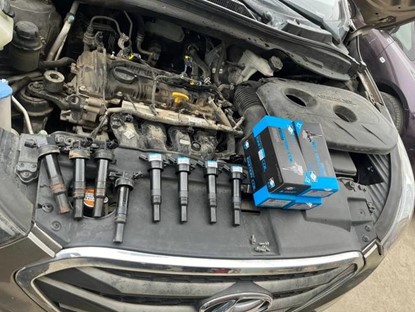
Your car’s ignition coils are the unsung heroes of its performance—they convert the battery’s low voltage into the high voltage needed to spark plugs, igniting fuel and powering your engine. But when one ignition coil fails, a common question pops up: Do I need to replace all of them? The answer isn’t one-size-fits-all, but this guide breaks down the key factors to help you make the right call, plus how to spot coil issues early.
First: Why Ignition Coils Matter (And What Happens When One Fails)
Ignition coils are critical to your engine’s function, and most cars use them in pairs—each pair is responsible for powering one cylinder’s spark plug. When even one coil malfunctions, it doesn’t just affect that single cylinder—it can throw off the entire ignition system. You’ll likely notice warning signs like:
- Difficulty starting your car (especially in cold weather)
- Unstable idling (your engine may shake or vibrate)
- Weak acceleration (your car feels sluggish when you press the gas)
- Increased fuel consumption (you’re filling up more often than usual)
- Engine misfires (a rough, uneven running engine)
These symptoms happen because a faulty coil can’t generate enough voltage to ignite fuel properly. Left unaddressed, it can lead to bigger problems—like damage to your catalytic converter or reduced engine life.
The Big Question: Replace One Ignition Coil or All?
The short answer: It depends on your car’s specific condition—you don’t always need a full replacement. Here’s how to decide:
When You Only Need to Replace the Faulty Coil
If a professional diagnosis confirms the issue is isolated to one specific cylinder (e.g., a single coil has worn out or short-circuited), you only need to replace that one coil. This is the most cost-effective option, especially if the other coils are still in good shape (e.g., your car is relatively new, or the coils were replaced recently). Just make sure to use a high-quality replacement coil that matches your car’s make and model—cheaper, mismatched coils can cause further electrical issues.
When a Full Replacement Might Be Smart (Even If Only One Fails)
While not mandatory, there are cases where replacing all coils makes sense for long-term reliability:
- Older coils: If your car has high mileage (e.g., over 100,000 miles) and the coils are original, the remaining coils may be near the end of their lifespan too. Replacing all at once prevents you from dealing with a second coil failure a few months later.
- Uniform wear: Ignition coils wear out over time due to factors like heat, vibration, and electrical stress—often at a similar rate. If one fails, others may be close to failing too.
- Simpler maintenance: Replacing all coils together ensures consistent performance across all cylinders. It also saves you time and labor costs down the line (you won’t need to revisit the repair shop soon).
What Causes Ignition Coil Failure?
To prevent future issues, it helps to understand why coils fail in the first place. Common causes include:
- Aging: Over time, the coil’s internal insulation breaks down from heat and use, leading to short circuits.
- Electrical problems: Faulty wiring, a weak battery, or a defective ignition controller can send unstable current to the coils, burning them out.
- Poor fuel quality: Low-grade gasoline can leave deposits on spark plugs, forcing coils to work harder (and wear out faster) to generate enough voltage.
- Extreme temperatures: Constant exposure to high engine heat (or cold, damp conditions) degrades the coil’s materials over time.
Key Tips to Protect Your Ignition Coils
- Stick to regular maintenance: Have a mechanic inspect your ignition system (including coils and spark plugs) during routine oil changes or service appointments. Early detection of issues saves you money.
- Use quality fuel: Opt for gasoline with the octane rating recommended by your car’s manufacturer—this reduces deposits and eases strain on coils.
- Address issues immediately: If you notice symptoms like rough idling or weak acceleration, don’t wait to get your car checked. A small coil repair now prevents costly engine damage later.
- Hire a professional: Always have a certified mechanic diagnose and replace ignition coils. DIY mistakes (like incorrect wiring) can damage your car’s electrical system.
Final Takeaway
Ignition coils are vital to your car’s performance, but you don’t need to replace all of them if only one fails—focus on isolating the problem first. Work with a mechanic to check if the issue is cylinder-specific, and then decide based on your coil’s age and condition. By staying proactive with maintenance and addressing failures quickly, you’ll keep your engine running smoothly and avoid unexpected breakdowns. If you’re experiencing ignition coil symptoms now, schedule a service appointment today—your car will thank you!